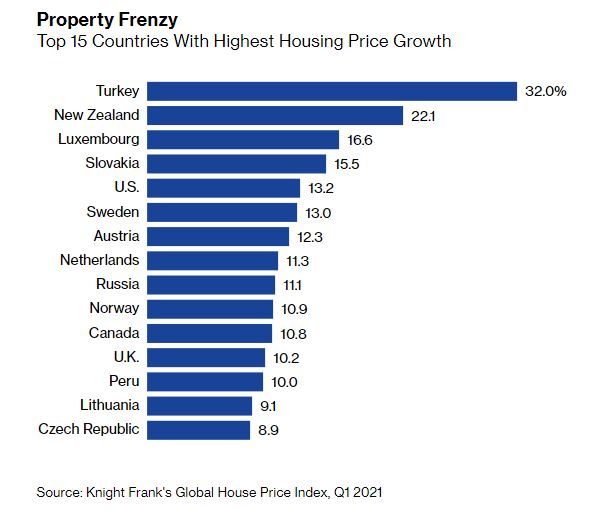June 2021 Financial Markets Summary
Life is getting back “closer” to normal. School is out for the summer, many companies are bringing employees back in the office, most mask mandates have been lifted and people are excited about planning their summer vacations. However, the housing market is nowhere remotely close to normal.
“Pick any housing statistic at random, and it’s probably setting an all-time record. Home prices: record high. Inventory: record low. Percentage of homes selling above asking price: record high. Average time on the market: record low,” according to The Atlantic’s Derek Thompson.
The housing boom is not just a United States phenomenon. The Knight Frank Global House Price Index, shows how many other countries are experiencing this same boom with Turkey, New Zealand, Luxembourg and Slovakia all seeing 15%+ real estate price hikes.

But what is causing this housing environment around the world? It comes down to the main Economics 101 concept of supply and demand. The demand for homes has spiked as more millennials look to move out of their apartments and into homes with more space. COVID-19 simply accelerated this shift after many felt constrained to small apartments while working from home. As the national savings rate peaked last year, this then left many homebuyers with extra cash to put towards their next home purchase. In addition, mortgage rates reached record lows which increased many homebuyers’ budgets for their new properties. All of these factors result in extremely high demand for homes.
Supply has also played an important role with many seniors electing to stay in their homes rather than transitioning to a senior living community. We also experienced a slowdown in building during the initial stages of COVID-19. The end result is a lower inventory of homes on the market.
Given the demographic shift with millennials, most economists do not predict this to result in another housing crash like 2007. However, we would expect housing to slow as mortgage rates start to tick up. We have already seen new home building slow as lumber prices jumped by over 250% in just the past 12 months. For those in the market for a new house, we recommend to be patient and not overbid on the first property that you walk through. For those selling, enjoy!
| Asset Index Category |
Category |
Category |
5-Year |
10-Year |
|
3-Months |
1-Year |
Average |
Average |
|
| S&P 500 Index – Large Companies |
10.3% |
38.1% | 14.9% |
12.5% |
| S&P 400 Index – Mid-Size Companies |
9.3% |
54.6% | 12.8% |
11.0% |
| Russell 2000 Index – Small Companies |
3.1% |
62.7% |
14.5% |
11.0% |
| MSCI ACWI – Global (U.S. & Intl. Stocks) |
8.6% |
43.9% | 14.1% |
9.9% |
| MSCI EAFE Index – Developed Intl. |
8.8% |
38.4% | 9.8% |
6.1% |
| MSCI EM Index – Emerging Markets |
3.3% |
51.0% | 13.9% |
4.2% |
| Short-Term Corporate Bonds |
0.4% |
3.6% | 2.5% |
2.0% |
| Multi-Sector Bonds |
-0.1% |
-0.4% | 3.3% |
3.3% |
| International Government Bonds |
-0.4% |
2.4% |
1.4% |
0.1% |
| Bloomberg Commodity Index |
8.9% |
46.2% |
2.9% |
-4.9% |
| Dow Jones U.S. Real Estate |
15.4% |
32.4% |
9.0% |
9.7% |
Please remember that past performance may not be indicative of future results. Different types of investments involve varying degrees of risk, and there can be no assurance that any specific investment, strategy, or product or any non-investment related content, made reference to directly or indirectly in this newsletter, will be suitable for your individual situation, or prove successful. This material is distributed by PDS Planning, Inc. and is for information purposes only. Although information has been obtained from and is based upon sources PDS Planning believes to be reliable, we do not guarantee its accuracy. It is provided with the understanding that no fiduciary relationship exists because of this report. Opinions expressed in this report are not necessarily the opinions of PDS Planning and are subject to change without notice. PDS Planning assumes no liability for the interpretation or use of this report. Consultation with a qualified investment advisor is recommended prior to executing any investment strategy. No portion of this publication should be construed as legal or accounting advice. If you are a client of PDS Planning, please remember to contact PDS Planning, Inc., in writing, if there are any changes in your personal/financial situation or investment objectives. All rights reserved.
